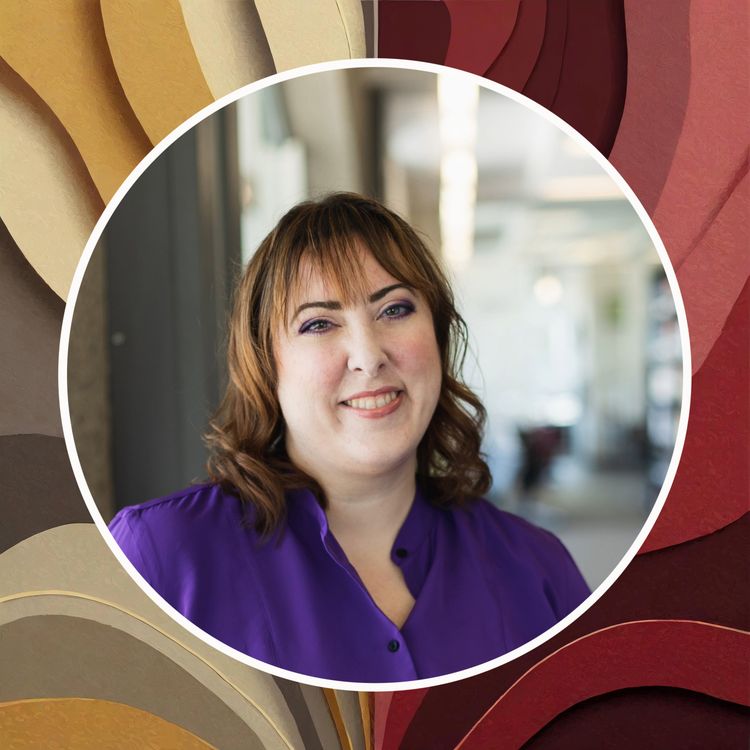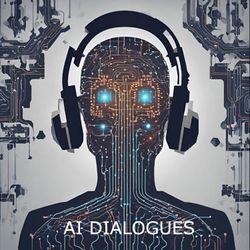Share

Deep Learning Dialogues
Part 1: Reimagining Citations for the AI Era with the AID Framework
Join Dr. Kari Weaver from the University of Waterloo as she introduces The Artificial Intelligence Disclosure (AID) Framework, a groundbreaking approach to disclosing AI use in academic work. In this first episode, Dr. Weaver discusses why traditional citations fall short in our AI-enabled world and how her framework provides much-needed structure for transparent AI attribution in education and research. Learn how this tool is helping educators and students navigate the complexities of AI integration while maintaining academic integrity.
Dr. Kari D. Weaver (she/her) is a Learning, Teaching, and Instructional Design Librarian at the University of Waterloo and is instrumental in contributing to policy and pedagogical conversations, decision-making, and professional development programming on generative artificial intelligence in teaching and learning at the University of Waterloo.
You can find Kari:
Feedback? You can ask your questions or give us feedback on the show here
Want to know more? You can check out our: WCDSB GenAI Guidelines, infographics, and Innovation website: https://innovate.wcdsb.ca/
More episodes
View all episodes

11. I-Think AI Challenge: Building Critical Thinkers of Tomorrow
37:30||Season 2, Ep. 11In this episode of Deep Learning Dialogues, we explore the innovative I-Think AI Challenge Kit with educator and coach Heidi Siwak. Learn how this unique program is empowering students to become critical thinkers and ethical users of artificial intelligence. From developing comprehensive AI challenge kits to facilitating student-led solutions for educational challenges, Heidi shares insights into how students are moving beyond initial AI skepticism to imagine and create positive applications for their school communities. Discover how the program addresses crucial aspects of AI education, including privacy concerns, bias awareness, and environmental impacts, while fostering students' problem-solving skills for an AI-enhanced future. You can read the full episode summary here.Heidi Siwak is a Teacher Coach at the education charity, I-Think, and creator of the Artificial Intelligence Challenge Kit for grades 6-12 students. Heidi was a classroom teacher in grades K-8 for the HWDSB for many years where she engaged students in innovative inquiry and project-based learning experiences focused on developing critical thinking and problem-solving skills. She is an advocate for student voice and agency. Heidi was seconded to the Ontario Ministry of Education supporting school board innovation research projects and integration of the Global Competencies through the Technology and Learning Fund. The question on her mind right now is, “How can we help students be critical thinkers about and thoughtful users of Artificial Intelligence?You can find Heidi at:email: heidi@i-thinktogether.orghttps://www.linkedin.com/in/heidisiwak/I-Think Challenge KitsFeedback? You can ask your questions or give us feedback on the show here Want to know more? You can check out our: WCDSB GenAI Guidelines, infographics, and Innovation website: https://innovate.wcdsb.ca/
10. Crossover Episode with "AI Dialogues" from the MacPherson Institute
23:02||Season 2, Ep. 10Originally aired on the McMaster University 'AI Dialogues' podcast, this episode features host Stephanie Verkoeyen in conversation with Whitney and Katrina, who share their firsthand experiences implementing generative AI at the Waterloo Catholic District School Board (WCDSB). Drawing from their work in K-12 education, they offer insights into how students and teachers are actively embracing GenAI in the classroom, exploring both the challenges and opportunities that arise. Their conversation bridges the gap between theoretical possibilities and practical applications, providing educators at all levels with actionable perspectives on integrating AI into their teaching practice.
9. Bridging the Divide: A Crossover Conversation on AI in Education
35:30||Season 2, Ep. 9In this crossover episode, Deep Learning Dialogues welcomes Stephanie Verkoeyen, educational developer at McMaster University and host of the AI Dialogues podcast, to discuss how post-secondary institutions are adapting to the rapid rise of generative AI technologies. The conversation explores evolving assessment strategies, challenges of AI plagiarism detection, the importance of fostering fundamental skills alongside AI literacy, and the potential for generative AI to drive pedagogical innovation. This episode touches on the need for stronger communication between K-12 and university leaders to ensure students are well-prepared for an AI-impacted educational landscape.Stephanie Verkoeyen (PhD) is an educational developer at McMaster University where she has been at the forefront of raising awareness and responding to its implications for higher education at McMaster. Stephanie has extensive experience facilitating interdisciplinary conversations and creating practical resources around Generative AI, and currently sits on McMaster’s AI Expert Panel on Operational Excellence, hosts the podcast AI Dialogues, and co-chairs the Council of Ontario Educational Developer’s GenAI Community of Practice.Episode Links:Generative Artificial Intelligence in Teaching and LearningArticle: Google's head of research on whether 'learn to code' is still good advice in the age of AIYou can find Stephanie at:LinkedInAI Dialogues PodcastFeedback? You can ask your questions or give us feedback on the show here Want to know more? You can check out our: WCDSB GenAI Guidelines, infographics, and Innovation website: https://innovate.wcdsb.ca/
8. Part 2: Reimagining Citations for the AI Era with the AID Framework
32:36||Season 2, Ep. 8We welcome back Dr. Kari Weaver for Part 2 of our exploration of the The Artificial Intelligence Disclosure (AID) Framework. Building on last week's introduction, we delve into practical applications for K-12 classrooms, focusing on how teachers can adapt these principles for different grade levels. Dr. Kari Weaver shares actionable strategies for implementing AI transparency in teaching and assessment. If you haven't already, listen to Part 1 first for the full context of this enlightening discussion.Dr. Kari D. Weaver (she/her) is a Learning, Teaching, and Instructional Design Librarian at the University of Waterloo and is instrumental in contributing to policy and pedagogical conversations, decision-making, and professional development programming on generative artificial intelligence in teaching and learning at the University of Waterloo.You can find Kari:University of WaterlooLinkedInFeedback? You can ask your questions or give us feedback on the show here Want to know more? You can check out our: WCDSB GenAI Guidelines, infographics, and Innovation website: https://innovate.wcdsb.ca/
6. UDL Reimagined: AI as Your Co-Planning Partner
44:04||Season 2, Ep. 6In this episode, education expert Chris Bronke explores how generative artificial intelligence can enhance Universal Design for Learning (UDL) practices in today's classrooms. Bronke, a consultant with Novak Education and former educator, shares practical insights on using GenAI as a planning partner to create more accessible learning environments for students. From breaking down assessment barriers to maintaining student engagement, discover how GenAI can help teachers meet diverse learning needs while saving valuable planning time. Whether you're new to UDL or looking to evolve your teaching practice, this episode offers actionable strategies for combining AI with universal design principles to support all learners.You can read a summary article of the episode here.An energetic teacher, presenter, and leader, Dr. Christopher Bronke brings a wealth of research, classroom, and leadership experience to professional learning while empowering participants to reflect deeply upon their own practice to facilitate growth and collaboration. After twenty years in the classroom and his last twelve also leading a team of 20+ English teachers, Bronke now passionately coaches and consults with teachers around the world to help create more inclusive classrooms for all learners.You can find Chris at:LinkedInInstagram @MrbronkeFeedback? You can ask your questions or give us feedback on the show here Want to know more? You can check out our: WCDSB GenAI Guidelines, infographics, and Innovation website: https://innovate.wcdsb.ca/
5. The AI Consciousness Illusion: Why We Think AI Has Feelings
28:36||Season 2, Ep. 5In this thought-provoking episode, we speak with Dr. Clara Colombatto from the University of Waterloo about her groundbreaking 2024 study on public perceptions of AI consciousness. The discussion reveals surprising findings that 67% of Americans attribute some level of consciousness to large language models like ChatGPT, with frequent users more likely to view these tools as having subjective experiences. Dr. Colombatto explores the implications of these perceptions for education, trust formation, and student interactions with AI tools. The conversation delves into practical strategies for educators and parents to help students develop healthy relationships with AI technology while maintaining critical thinking skills and human connections. Through expert insights and real-world examples, this episode offers valuable guidance for navigating the complex intersection of AI, education, and human psychology.You can read a summary article of the episode here.Dr. Clara Colombatto is an Assistant Professor in the Psychology Department at the University of Waterloo, where she directs the Vision and Cognition Laboratory. Her research focuses on various aspects of perception and cognition, with a particular focus on the perception of other’s mental states. Using tools from vision science and social psychology, her work has shown how others' states such as their intentions and attention are extracted in automatic and even unconscious ways, and go on to influence our own attention and metacognition. Her recent research has extended this program to include the perception of agents such as AI, revealing mechanisms of mind perception in non-biological agents and their consequences, from attention to decision-making.You can find Clara at:https://colombattolab.com/https://uwaterloo.ca/psychology/profiles/clara-colombattoFeedback? You can ask your questions or give us feedback on the show here Want to know more? You can check out our: WCDSB GenAI Guidelines, infographics, and Innovation website: https://innovate.wcdsb.ca/
4. The Post-Plagiarism World: Reimagining Student Disclosure in the AI Era
20:27||Season 2, Ep. 4In this thought-provoking episode of Deep Learning Dialogues, we explore a transformative question: What happens when we move beyond traditional notions of plagiarism in education? Our guest Sarah Elaine Eaton explains why requiring students to disclose AI use might be a temporary phase, drawing fascinating parallels to how we once treated dictionaries and now accept spell-check without question. Through engaging discussions about technology's evolution in education—from radio to television to AI—we unpack common fears and moral panics surrounding new tools in the classroom. The conversation challenges popular misconceptions about AI diminishing creativity and instead reveals how it might enhance human potential. Most importantly, we arrive at a reassuring conclusion: while the tools of education evolve, the irreplaceable role of teachers remains constant in shaping the future of learning. You can read more about the episode here.Sarah Elaine Eaton is a Professor and research chair at the Werklund School of Education at the University of Calgary (Canada). She is an award-winning educator, researcher, and leader. She leads transdisciplinary research teams focused on the ethical implications of advanced technology use in educational contexts. Dr. Eaton also holds a concurrent appointment as an Honorary Associate Professor, Deakin University, Australia.Faculty Profile: https://profiles.ucalgary.ca/sarah-elaine-eatonPersonal Blog: https://drsaraheaton.wordpress.com/Twitter: https://twitter.com/DrSarahEatonFeedback? You can ask your questions or give us feedback on the show here Want to know more? You can check out our: WCDSB GenAI Guidelines, infographics, and Innovation website: https://innovate.wcdsb.ca/LinkedIn: https://ca.linkedin.com/in/drsaraheaton
3. Empowering Minds: The Critical Role of AI Literacy in Schools
38:18||Season 2, Ep. 3In this episode of Deep Learning Dialogues, we dive into the world of AI literacy in education with Jillian Kowalchuk, Manager of AI Literacy at the Alberta Machine Intelligence Institute (https://www.amii.ca/). Kowalchuk shares her insights on the importance of understanding and effectively utilizing AI in educational settings, discussing both the opportunities and challenges it presents. She explores common misconceptions about AI in education and offers strategies for integrating AI literacy into classrooms. Kowalchuk also emphasizes the need to balance technological advancements with maintaining the crucial human elements in teaching and learning.Where to find her:LinkedIn: linkedin.com/in/jilliankowalchukWebsite: https://www.jilliankowalchuk.ca/ Read the episode article hereFeedback? You can ask your questions or give us feedback on the show here Want to know more? You can check out our: WCDSB GenAI Guidelines, infographics, and Innovation website: https://innovate.wcdsb.ca/